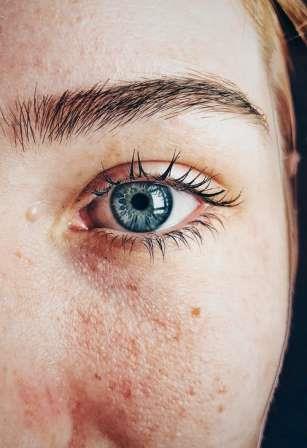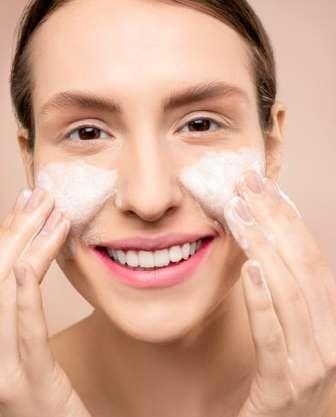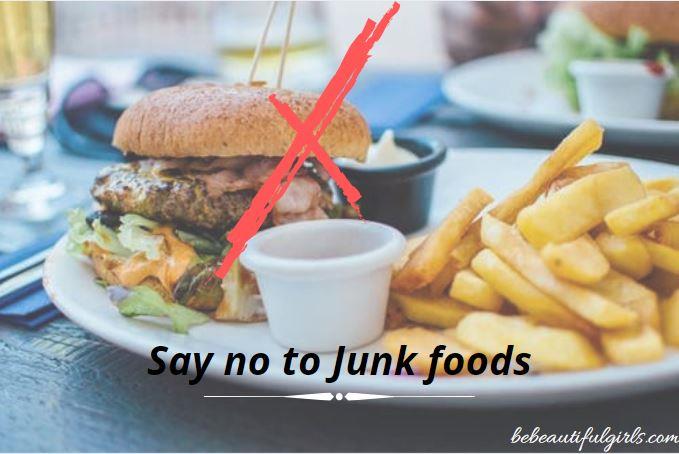We all have different kinds of skin. Skin is mainly classified into five types, normal skin, dry skin, oily skin, sensitive skin, and combination skin.
Combination skin is dry in certain parts and oily in others. In short, it is a mixture of oily and dry skin. Some of us have dry, sensitive skin that is susceptible to redness, inflammation, fine lines, wrinkles, and so on. Even some have greasy skin which is very difficult to manage.
Figuring out the ideal skincare regimen for oily skin may be harder than it sounds. Today I will be telling you all about taking care of your oily shiny skin and how you can manage oily skin.
What causes oily skin?
Our skin naturally produces oil called sebaceous glands. They make our skin more soft and supple or flexible and it also acts as a lubricant on our skin. These oil glands form a thin protective layer of oil on the skin, which is extremely necessary for healthy skin.
Sometimes for various reasons sebaceous glands overproduce sebum on our face and secrete excess oil. This excess sebum or overproduction of sebum is caused our skin to appear oily, greasy, and sticky.
An excessive amount of oil causes the skin pores to get clogged with dirt and dead skin cells which can cause acne breakouts on our skin. Also, this oiliness may cause larger or more visible pores.
People with oily skin tend to possess a lot of skin disorders and pimples and their skin may look dull.
There are two types of oily skin and you need to know where to categorize yourself in this because it will be very important in your skincare routine.
- Your skin produces oil all over your face. So no area on your face doesn’t produce oil.
- Combination skin type implies that some areas of your face produce too much oil mostly on your forehead, nose, and chin. This is also called the T-zone. T-zones or your forehead, nose down to your chin are the areas that produce too much oil if you have combination skin but other areas of your skin don’t produce too much oil.

Why does our skin get very oily?
Normally the oil is necessary for the health of the skin. It keeps skin smooth, prevents it from drying, and also treats the appearance of wrinkles on the skin.
But if an excessive amount of oil on the skin tends to have fewer wrinkles. Excess oil catches dust, smoke, and other pollutants from the air and clogged pores.
It also permits fungal and bacterial infections to develop on the skin, that’s why people whose skin is very oily usually get fungal infections and pimples on their faces.
Why do some people have oily skin?
Your skin type is often based on your genetics or hereditary. It means that you inherited it from your parents or your family has oily skin. Genetics or hereditary factors can determine how our skin reacts to fluctuating hormones or hormonal changes.
If you’re a teenager, this might be the cause of the hormones in your body, are fluctuating which results in high levels of androgen. Androgen signals the maturity of our sebaceous glands.
According to the research the Skin can become oily due to the high level of androgen. Also, the hormonal fluctuations caused by oily skin occurs during puberty, pregnancy, or menstrual cycles.
Apart from this, your lifestyle habits, environmental factors, don’t cleanse your skin, or removing makeup properly can also play a role in making your skin oily. For many, sleep habits and stress levels trigger shiny skin.
Tips to cure oily skin:
Right skincare products play a major role in healthy-looking skin. Let’s discuss some important tips that you can use to keep your skin oil-free or control the oil production on your skin naturally.
Tip 1: Cleanse your face properly.
Always use an oil-free cleanser to wash your oily face. You can use cleansers containing acne-fighting ingredients such as benzoyl peroxide, salicylic acid or glycolic acid, niacinamide, or even alpha hydroxy, beta hydroxy acid, or hyaluronic acid-based cleansers.
Wash your face twice a day using lukewarm water. Over-cleansing can lead to increased oil production.

Now in cleansing products, there is something called surfactants. These are basically the detergents, the cleansing ingredients that bind into the oil and dissolve them in the water.
However, the downside of using face wash probably too many times is it can dissolve our natural lipid skin barrier. Always use a much gentler, non-foaming, gel facial cleanser that is pH balanced and acts as an acne treatment cleanser.
Look for a slightly acidic cleanser that doesn’t mess up with your skin’s natural PH. Surfactants, when it’s remained on your skin it keeps dissolving oil, so your skin gets drier.
Tip 2: Moisturize your skin.
Most people think that if they have oily skin, they don’t need to use a moisturizer. It’s really important to use a light moisturizer even on oily skin. You shouldn’t use heavy or oily creams.
You can use lotion or hydrating moisturizers, or gel creams with hyaluronic acid or aloe Vera ceramides for maintaining moisture levels.
The protective layer of oil is removed after cleansing or scrubbing. Your skin may even get dry or irritated. So, when you cleanse your oily face, your skin it is getting too dry and needs more oil.
You may have noticed that your skin may look dry or oil-free for a couple of hours after cleansing but starts looking oily once again. That’s why you should use an oil-free and hydrating moisturizer after washing your face.

You can also use a non-comedogenic Moisturizer for acne-prone skin. This prevents the secretion of compensatory oil.
To make sure your skin doesn’t overproduce oil. So when you use a moisturizer you actually help your skin to balance your excess oil production, therefore making you less oily.
You should use an oil-free moisturizer to moisturize your skin for sure. Moisturizing gels protect our skin from dehydration and from drying out.
So, it creates skin flaking and maintains natural moisture. Moisturize daily, twice, or thrice a day if necessary. Keep in mind that you don’t over-moisturize your skin.
Tip 3: Don’t use toner.
Normally moisturizers are enough to keep your skin hydrated and balanced. But people with oily shine skin often use toners, which is an astringent. Routine toners contain alcohol and remove the oil from your skin.
But toner causes your skin to become very dry. If you have acne-prone skin, do not use a toner in the areas prone to acne.
If you want to use toners, make sure that they are alcohol-free toner. Also, Rosewater is a good toner because it reduces oil secretion and maintains the skin’s PH balance.
Tip 4: Use sunscreen.
All skin needs to wear sunscreen every day. For oily skin, I would always recommend looking for a mineral sunscreen with active ingredients like titanium dioxide or zinc oxide that isn’t going to cause you irritation or “make you break out.”
Also, you can use lotion or gel-based sunscreens, matt finish sunscreens, and even water-based sunscreen. It protects your delicate skin from the sun’s ultraviolet A and B rays.
Apply sunscreen 20-25 minutes before going outside and reapply sunscreen every 2 or 3 hours. Your sunscreen should be broad spectrum with SPF 30 or SPF 50.
Tip 5: Scrub or exfoliate your skin gently.
Often people scrub or exfoliate the skin to get rid of the oiliness or greasiness. Excessive scrubbing may cause your skin to get even oilier. I’m not saying that you shouldn’t exfoliate or scrub.
In fact, you should gently exfoliate your skin once every week to remove the dead skin cells and maintain the overall health of your skin. But daily or frequent over-exfoliation will remove the necessary amount of oil and it can make your skin oilier.
Tip 6: Use products that suit your skin type.
Always use oil-free, non-comedogenic, water, or gel-based products for oily skin. Never use thick creamy or heavy lotion.

Tip 7: Use oil-free and non-comedogenic makeup products.
Those who have oily skin should not put on heavy makeup because oil and heavy cosmetics cause pore to get blocked and this leads to the formation of pimples. It should be made with lighter formulations and use mineral makeup.
Cheap makeup often contains asbestos and also Mica, in the form of contaminants that leads to blockage of pores and also cause irritation, allergy, pimples, or other skin issues in the skin.
Before you go to sleep at night clean the makeup from your face with a gentle cleanser and then don’t forget to apply an oil-free moisturizer.
Tip 8: Change your pillow covers and bedsheets frequently.
This will prevent the accumulation of Acne causing bacteria. That is why you have to prevent the bacteria buildup so that the acne or pimple breakouts stop or reduce.
Tip 9: Eat healthy food.
You must have heard that treating acne with oral or topical medicines and at times even clinical methods should be possible. It is similarly essential to keep up a healthy diet.
Fried foods, sugary foods, spicy foods, junk foods, soft drinks, aerated cold drinks, sweets, chocolates, and dairy products like ice cream, cheese, and milk may trigger oily skin in some people.

If you notice that your skin gets oilier with such foods, you should avoid eating these foods. These are the foods that can also influence skin breakout and trigger an inflammatory response in your body that influences the skin cells and eventually pumps out more gloopy sebum.
It’s best to stay away, or, keep it at a very low level in your diet. If you eat healthy foods like fresh fruits and vegetables, your body will get detoxified and your skin will glow.
Drink 2-3 liters of water in the day to keep your skin hydrated, this will decrease skin inflammation breakouts.
Vitamins A and D are fat-soluble vitamins that affect our sebaceous gland which is basically a production house that pumps out the oil. So, it has the ability to manage sebum production, as well.

Tip 10: Oil is not your enemy! Some might be, but not all.
Oily or combination skin types tend to be deficient in Linoleic Acid is one of the fatty acid contents. So, once you are deficient in this Linoleic Acid what happens is that your sebum tends to produce a little bit more and a little bit gloopier, stickier.
So, it has a higher chance to clog the pore. So, if you choose the right essential oil that is Linoleic Acid high and then low in Oleic Acid content, it can really rebalance your skin by fuelling through Linoleic Acid deficiency.
And it also moisturizes your skin by locking in the hydration that you already fed on. Some popular essential oils for oily skin types include Rosehip Seed oil, Hemp Seed Oil, Pumpkin Seed Oil, Grape Seed Oil, and Jojoba oil.
There are so many other wonderful natural oils that can really help your skin out in regulating and managing sebum production or even produce your sebum in a very healthier way.
Tip 11. Don’t rub the face.
When you wipe your facial skin, you should not rub it with a towel because oily skin is already soft, to begin with, and rubbing it will cause abrasions which will cause burning and it can also lead to fungal and bacterial infections.
Tip 12: Consult a doctor before taking any medicated creams.
If you have very oily skin, you can use certain medicated creams as well. Retinol or vitamin A is a good option. Retinols are pretty strong and are used as an acne treatment.
You can use a topical cream with less concentration of retinol to control oily skin and also blurs the appearance of large pores. So, use the creams recommended by dermatologists.
Overview
These were a few tips for oily skin care. You can control your oily skin by following all these tips, home remedies, and a healthy diet. Keep in mind that sebum or oil is necessary for the health of your skin. So, You can take good care of your skin with a healthy and regular skincare routine.
Leave a Comment